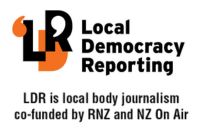Greenpeace offers testing after ‘ECan failure’

Greenpeace is offering free drinking water nitrate testing in Mid Canterbury this weekend after the regional council decided against rolling out its own free testing.
Will Appelbe, Greenpeace’s Canterbury-based freshwater spokesperson, said safe drinking water is a fundamental human right.
"We want to ensure that people are aware of the risks associated with nitrate and that they know what’s in their water."
It was unfair that bore owners currently have to pay for their own tests to ensure their water is free from pollution they didn’t create, he said.
Environment Canterbury chairperson Craig Pauling said the regional council has acknowledged the challenge of nitrate in drinking water in Canterbury and has done so for a long time.
“We’ve been working with the community to address it for many years and will continue to do so.
“We recognise the importance of comprehensive monitoring data to inform our planning, consenting and compliance activity.”
The council opted against region-wide testing events as the cost of private testing falls to bore owners, he said.
Instead, ECan extended an awareness campaign so private well owners knew of potential risks and the need to test wells regularly, he said.
“We also agreed to additional scientific testing of private wells in high-risk areas to understand the risk profile for private well owners compared with the overall catchment.
“There are multiple agencies with different roles in the protection of water sources and we very much welcome the actions of other agencies such as Greenpeace and the water zone committees for working with the community in this space.”
ECan estimates between 25,000-30,000 private wells in Canterbury are used for drinking water, but the council did not hold data on all wells, as landowners did not need consent to take drinking water.
Greenpeace held testing in Mid Canterbury in 2021 and will be back in Ashburton and Methven this weekend to provide certainty around whether people’s drinking water is safe, spokesperson Appelbe said.
"The cost of using a conventional testing service can be prohibitive, and for those who are not on council-monitored water supplies, they bear the burden of paying for testing.”
There is a growing body of science showing an increased health risk associated with levels of nitrate in drinking water lower than 11.3 mg/L - New Zealand’s maximum allowable value of nitrate in drinking water, he said.
"ECan’s recent decision to roll out a pilot study to test for nitrate levels is a decent measure, but they fell short of providing region-wide nitrate testing events for private well owners.
“It was incredibly concerning that the regional council, which is responsible for protecting source water – and therefore drinking water – from pollution, is failing to provide this critical service.”
Water quality testing is up to the water supplier, which ECan is not, and is regulated by Taumata Arowai – New Zealand’s water services authority.
Ashburton District Council, as a water supplier, collects nitrate samples monthly from all council public drinking water supplies.
Infrastructure and open spaces group manager Neil McCann said the council has an expansive drinking water quality monitoring programme, including for nitrates, that has been in place since 2013.
“There is no requirement for customers connected to a council public supply to conduct their own testing.”
Data from the council’s monitoring programme is freely available by request, he said.
“Private bore maintenance and monitoring are the responsibility of the bore owner.”
Owners should be testing for E.coli and nitrates annually, he said.
Costs for this analysis are around $45 per E.coli sample and $25 per nitrate sample.
Free Testing Events
Greenpeace will be testing drinking water in Ashburton from 10:30am-4:30pm on Friday April 4 at the Ashburton Events Centre, and then in Methven from 1pm-5pm on April 6 at the Mt Hutt Memorial Hall
By Jonathan Leask

